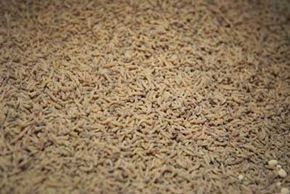Helpful Houseflies
So germ-carrying houseflies come into our homes uninvited and begin walking, feeding, vomiting and laying eggs all over our personal belongings. They bring the risk of disease and, in return, we do out best to wipe out any unwelcome visitor. But are they really that bad?
While there's not much good to be said for their presence inside the home, like all flies, they fulfill an important environmental role as scavengers. As houseflies and their larvae feed, they consume nutrients in rotting organic matter. They leave behind picked-over remains that other organisms, bacteria and enzymes can further break down.
Advertisement
Flies and their larvae are also an important food source for a large number of predators. Housefly pupae contain large amounts of protein and are thus especially beneficial to the various birds, reptiles, and insects that prey on them. After all, there's a reason maggots are often purchased as bait by freshwater fisherman. Commercial tilapia farmers have considered feeding their fish housefly maggots exclusively. You can even purchase frozen or freeze-dried housefly pupae to feed pet spiders.
However, if you happen to be reading this, you're probably not a spider or an ecosystem, in which case you want to cut down on the local housefly menace. Learn all about housefly management on the next page.
